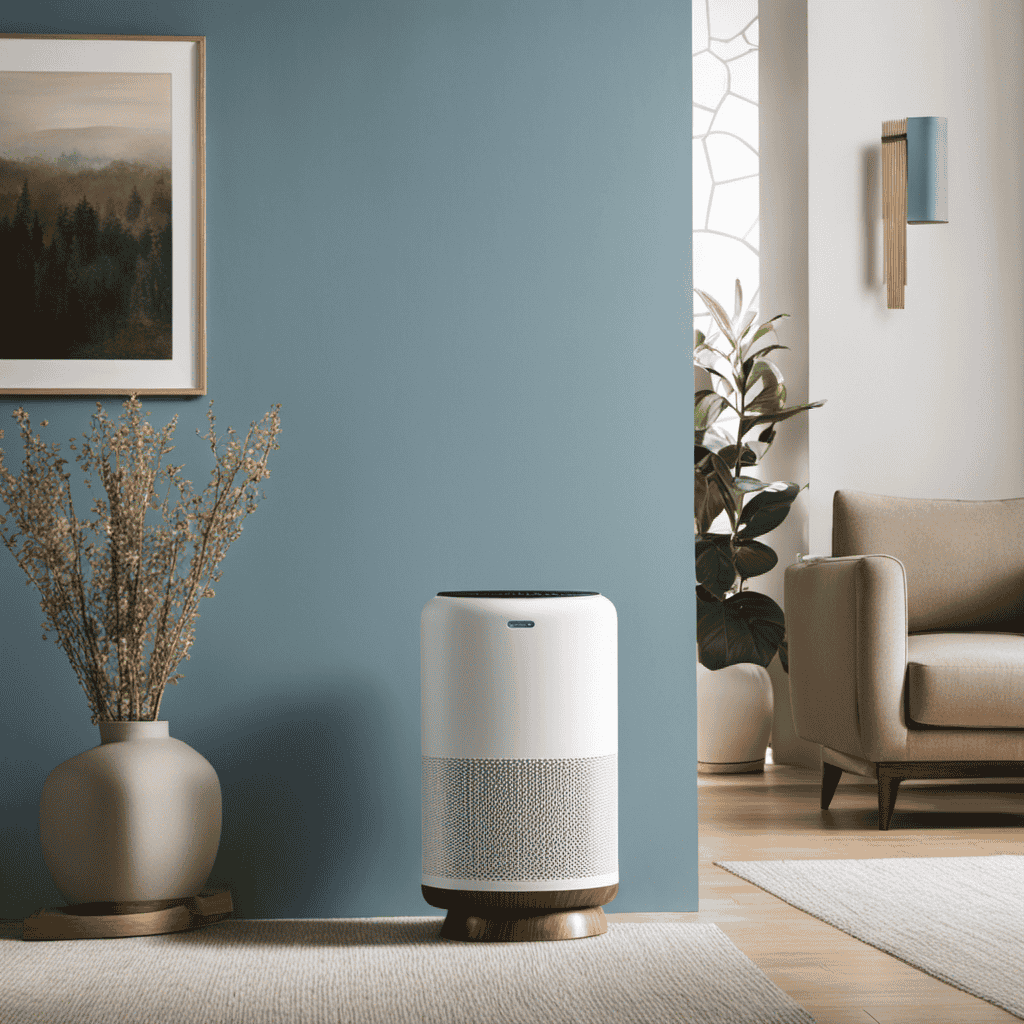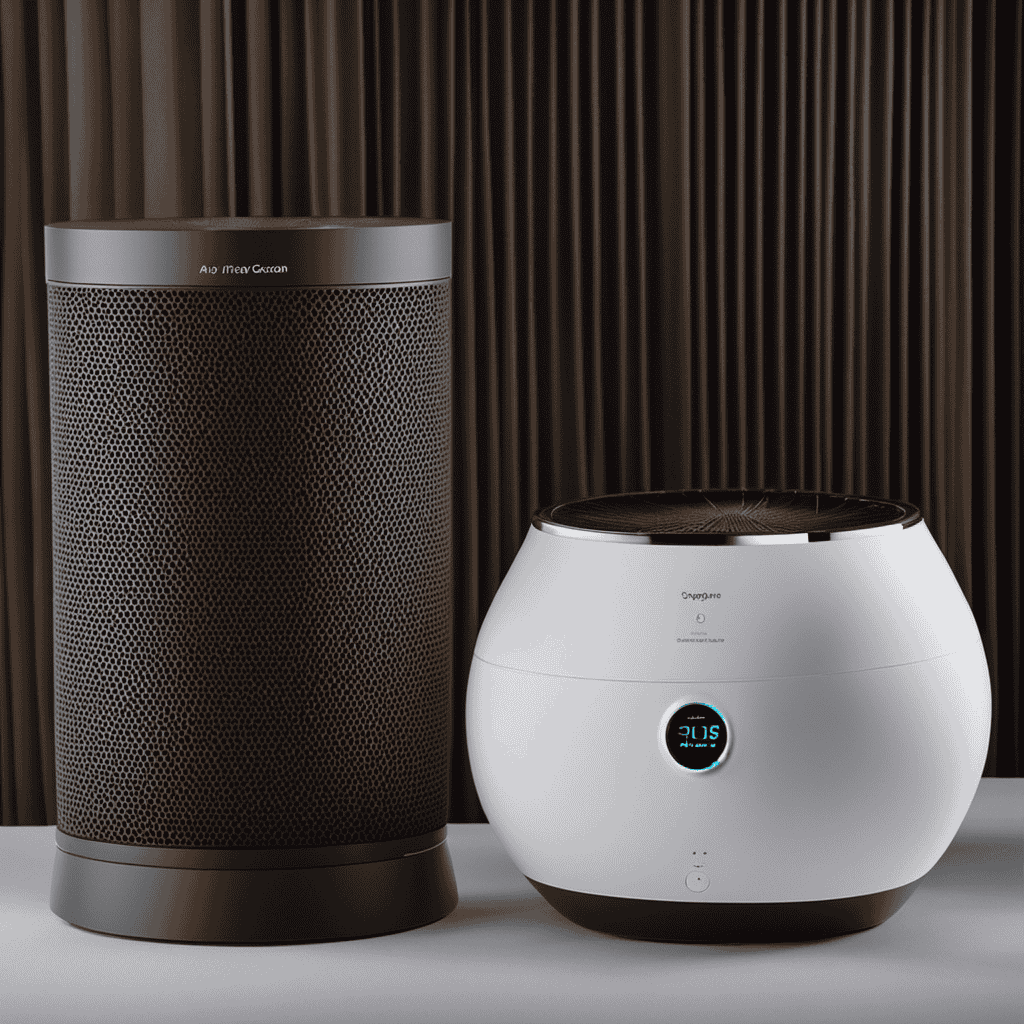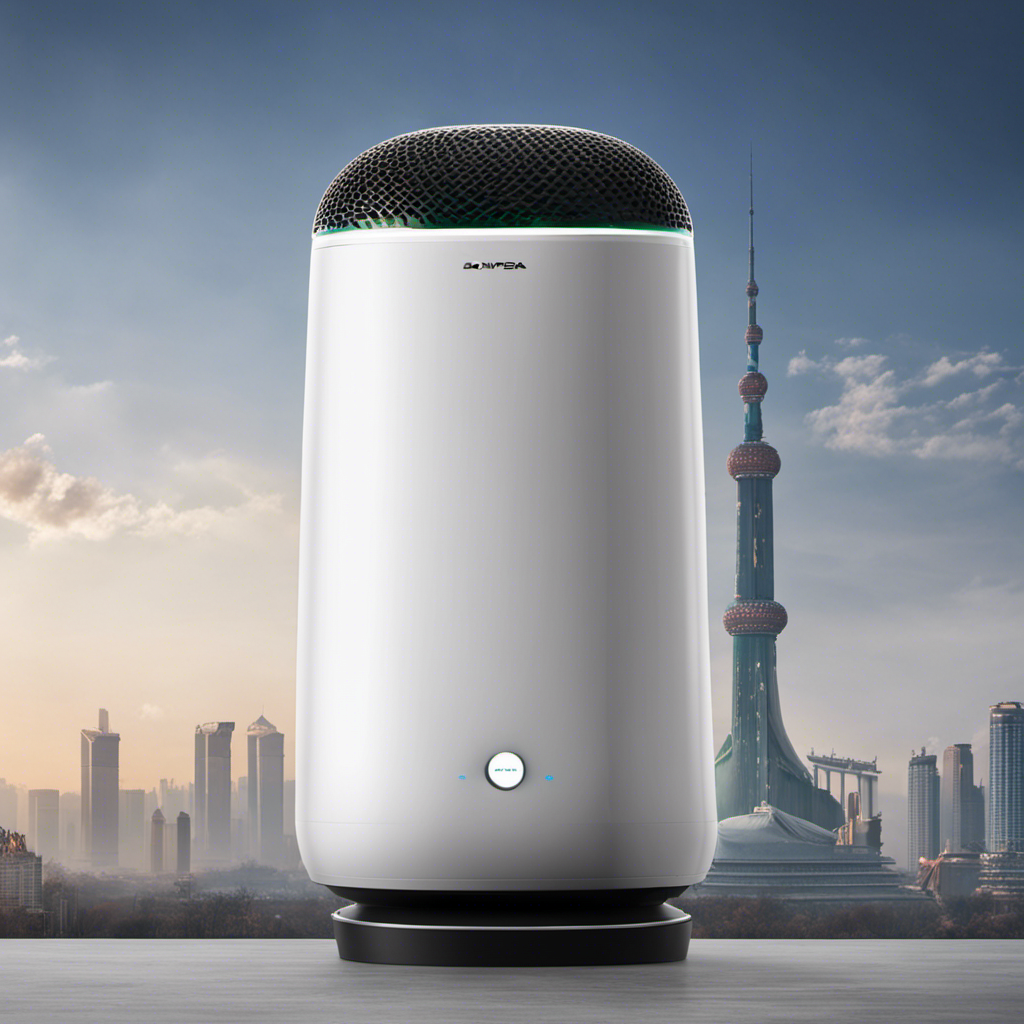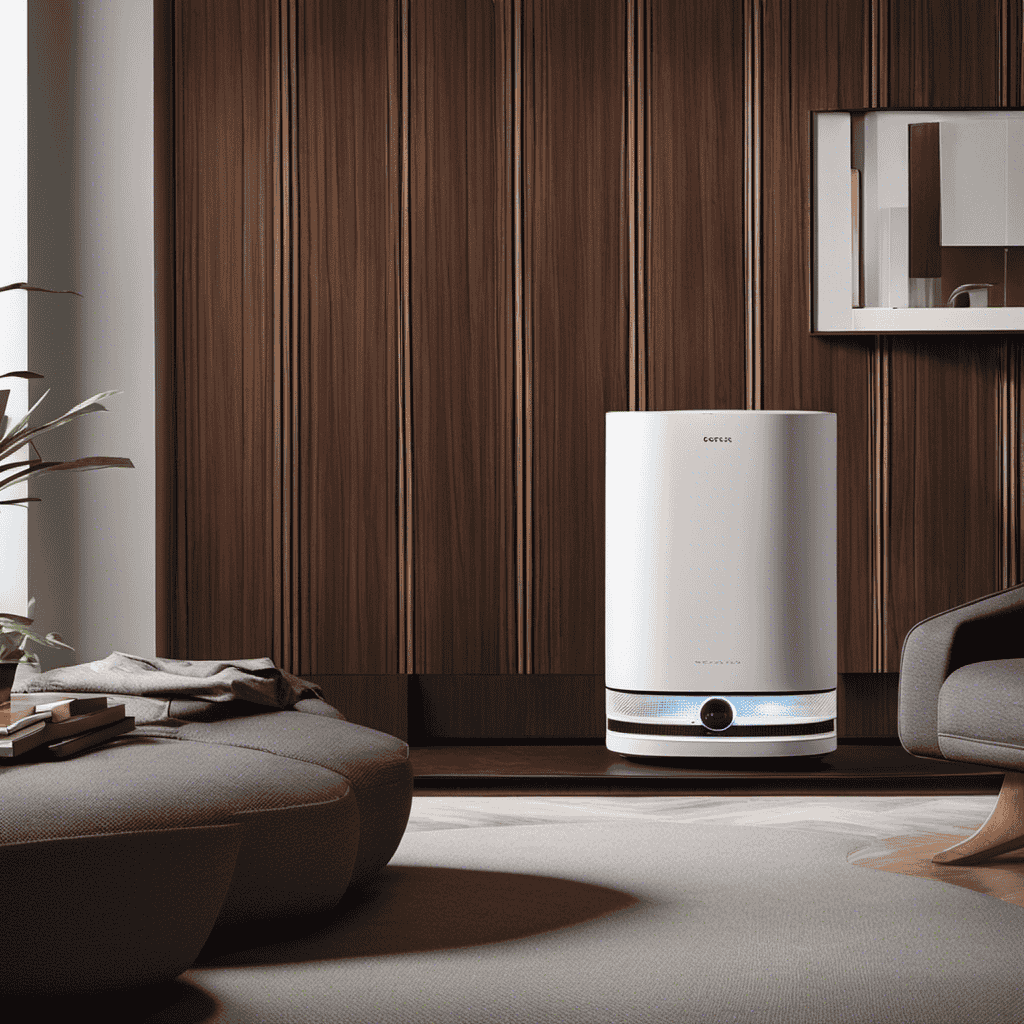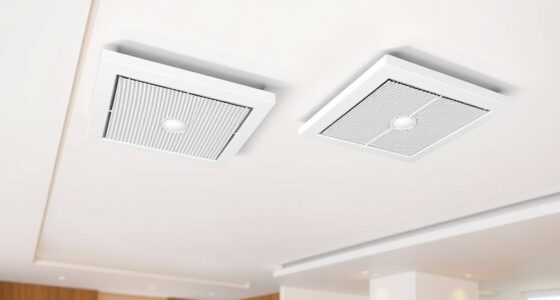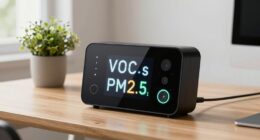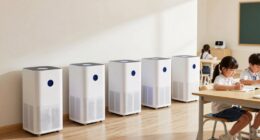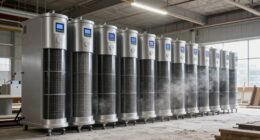Being an individual who prioritizes breathable air and a wholesome living space, I can assert without a doubt that an air purifier acts as a defensive barrier against unseen assailants. It effectively removes dangerous pollutants, allergens, and odors, enhancing the quality of air inside and minimizing the chances of developing respiratory diseases.
With the added benefits of allergy relief, reduced asthma symptoms, and better sleep quality, an air purifier is a game-changer for your overall well-being.
Let’s delve into the evidence and explore the multitude of benefits that this technological marvel offers.
Key Takeaways
- Air purifiers actively eliminate harmful pollutants, allergens, and odors.
- They improve indoor air quality and reduce the risk of respiratory infections.
- Air purifiers help address respiratory issues such as asthma, allergies, and lung cancer.
- By removing pollutants, air purifiers create a healthier breathing environment.
Health Benefits
You’ll notice a significant improvement in your overall health with an air purifier.
Air pollution, especially the presence of dust particles, can have a detrimental effect on our health. These tiny particles can enter our respiratory system and cause respiratory issues such as asthma, allergies, and even lung cancer.
However, an air purifier can help address this problem by effectively filtering out these harmful particles from the air. Studies have shown that using air purifiers can reduce the levels of indoor air pollutants, including dust particles, by up to 99%.
By removing these pollutants from the air, air purifiers can help improve our indoor air quality and create a healthier environment for us to breathe in.
Transitioning into the next section, let’s explore the various ways air purifiers contribute to improved indoor air quality.
Improved Indoor Air Quality
As an expert in indoor air quality, I can confidently say that investing in an air purifier can greatly contribute to a healthier breathing environment. These devices are designed to remove harmful pollutants such as dust, pollen, pet dander, and mold spores from the air, which can be especially beneficial for individuals with allergies and asthma.
Scientific studies have shown that using an air purifier can provide relief by reducing the presence of these allergens in indoor spaces, ultimately improving overall respiratory health.
Healthier Breathing Environment
Breathe easier with an air purifier, as it helps create a healthier breathing environment by removing pollutants from the air. Air purification offers several benefits, including the following:
-
Improved respiratory health: Clean air reduces the risk of respiratory issues, such as allergies, asthma, and other respiratory conditions.
-
Reduced exposure to harmful substances: Air purifiers effectively eliminate harmful substances like dust, pollen, pet dander, mold spores, and volatile organic compounds (VOCs) from the air.
-
Dust and pollen: These common allergens can trigger allergies and respiratory distress.
-
Pet dander and mold spores: These irritants can worsen asthma symptoms and cause respiratory problems.
-
VOCs: Found in cleaning products, paints, and furniture, VOCs can lead to headaches, dizziness, and respiratory issues.
By ensuring clean air, air purifiers create a healthier breathing environment, reducing the risk of respiratory problems and enhancing overall well-being.
Transitioning into the next section about ‘allergy and asthma relief,’ we will explore how air purification can specifically help those suffering from allergies and asthma.
Allergy and Asthma Relief
Transitioning into the next section, I’ll explore how air purification can specifically help those suffering from allergies and asthma.
Allergy prevention and respiratory health are two key benefits of using an air purifier. Air purifiers are designed to remove allergens and irritants from the air, such as pollen, dust mites, pet dander, and mold spores. By eliminating these triggers, air purifiers can greatly reduce the symptoms of allergies and asthma, providing much-needed relief.
Multiple studies have shown that air purifiers can effectively remove airborne allergens and improve indoor air quality. This is particularly important for individuals with allergies or asthma, as poor air quality can exacerbate their symptoms and lead to increased respiratory distress.
Investing in a high-quality air purifier can significantly improve the overall well-being and comfort of those suffering from these conditions.
Removes Harmful Pollutants
Using an air purifier can significantly reduce the presence of harmful pollutants in the air, improving respiratory health and providing relief for individuals with allergies and asthma. Air purification technology plays a crucial role in removing indoor pollutants, creating a cleaner and healthier environment.
Here are two sub-lists that highlight the importance of air purification:
- Benefits of air purification technology:
- Removes particulate matter: Air purifiers can effectively capture and eliminate airborne particles such as dust, pollen, pet dander, and mold spores. This helps reduce the risk of respiratory issues and allergies.
- Eliminates volatile organic compounds (VOCs): Air purifiers equipped with activated carbon filters can effectively trap and remove VOCs, which are harmful chemicals found in household products, paints, and cleaning agents. This helps improve indoor air quality and reduces the risk of long-term health effects.
Allergy Relief
An air purifier can help with allergy relief by reducing the amount of allergens in the air you’re breathing. It is an effective tool for preventing allergies as it purifies the air by trapping and removing allergens such as dust mites, pollen, pet dander, and mold spores.
The effectiveness of air purifiers in reducing allergens has been backed by scientific research. Studies have shown that air purifiers can significantly decrease the concentration of indoor allergens, leading to a reduction in allergy symptoms.
Reduction of Asthma Symptoms
By consistently maintaining a clean and allergen-free environment, you can significantly reduce your asthma symptoms. Asthma management is crucial for maintaining good respiratory health. Here are some reasons why an air purifier can help in reducing asthma symptoms:
-
Removal of allergens: Air purifiers use filters to trap allergens such as dust mites, pollen, pet dander, and mold spores. This prevents these triggers from entering your respiratory system and triggering asthma attacks.
-
Improved indoor air quality: Air purifiers effectively remove harmful pollutants from the air, including volatile organic compounds (VOCs), smoke, and chemicals. Breathing in clean air reduces the risk of asthma symptoms.
-
HEPA filtration: High-Efficiency Particulate Air (HEPA) filters can capture particles as small as 0.3 microns, effectively removing allergens that can trigger asthma symptoms.
-
Activated carbon filters: These filters can absorb and neutralize odors and chemicals, enhancing the air quality further.
Elimination of Odors
After discussing how air purifiers can reduce asthma symptoms, let’s now explore another benefit: the elimination of odors.
One of the main reasons people invest in air purifiers is to get rid of unpleasant smells in their homes or offices. Air purifiers effectively remove various types of odors, including those caused by cooking, pets, and tobacco smoke. They achieve this by utilizing filters that trap odor-causing particles and neutralize them, leaving behind fresh air.
Some purifiers even employ additional technologies like activated carbon filters or ionizers to further enhance odor elimination. So, if you’re tired of dealing with lingering smells in your living space, consider investing in an air purifier to enjoy clean, fresh-smelling air every day.
Removal of Harmful Pollutants
Let’s explore how air purifiers effectively remove harmful pollutants from the air. Air purifiers play a crucial role in improving indoor air quality by eliminating airborne contaminants. Here’s how they work:
-
Filtration:
-
HEPA filters: These high-efficiency particulate air filters capture particles as small as 0.3 microns, effectively trapping pollutants such as dust, pollen, pet dander, and mold spores.
-
Activated carbon filters: These filters use a process called adsorption to remove volatile organic compounds (VOCs), odors, and chemicals from the air.
-
Ionization:
-
Some air purifiers use ionizers to release negative ions into the air. These ions attach to airborne particles, causing them to become heavy and fall to the ground or stick to surfaces, reducing their presence in the air.
Prevention of Respiratory Infections
Cleaner indoor air and improved lung health go hand in hand when it comes to the benefits of air purifiers. These devices are designed to remove harmful pollutants and contaminants from the air we breathe, creating a healthier environment for our respiratory system.
Studies have shown that cleaner indoor air can lead to a decrease in respiratory infections and a reduction in symptoms for those with respiratory conditions such as asthma or allergies. So, investing in an air purifier can not only provide immediate relief but also contribute to long-term lung health.
Cleaner Indoor Air
To improve the quality of the air you breathe indoors, you can use an air purifier. Air purifiers are designed to remove airborne contaminants and improve the overall air quality in your home or office.
Here are some key benefits of using an air purifier:
-
Air filtration: Air purifiers are equipped with filters that can capture and remove various airborne contaminants such as dust, pollen, pet dander, mold spores, and even bacteria and viruses.
-
HEPA filters: High-Efficiency Particulate Air (HEPA) filters are commonly used in air purifiers. They can capture particles as small as 0.3 microns with an efficiency of 99.97%, ensuring cleaner air for you to breathe.
-
Activated carbon filters: These filters are effective in removing odors, volatile organic compounds (VOCs), and chemicals from the air, creating a fresher and healthier indoor environment.
Improved Lung Health
Using an air purifier with HEPA filters can greatly improve your lung health. The benefits of improved lung function and respiratory health are well-documented. HEPA filters are designed to capture and remove tiny particles from the air, including allergens, dust, and pollutants. By removing these harmful particles, air purifiers help reduce the risk of respiratory issues such as asthma, allergies, and chronic obstructive pulmonary disease (COPD).
Here is a table summarizing the respiratory health benefits of using an air purifier:
| Benefit | Description |
|---|---|
| Reduced Allergens | HEPA filters trap allergens like pollen, pet dander, and dust mites |
| Cleaner Indoor Air | Purifiers remove pollutants and odors, improving overall air quality |
| Decreased Asthma Risk | Cleaner air reduces triggers for asthma attacks |
Research has shown that using air purifiers with HEPA filters can lead to improved lung function and better respiratory health. By investing in an air purifier, you can create a healthier environment for yourself and your family.
Better Sleep Quality
You’ll notice a significant improvement in your sleep quality with an air purifier. Air purifiers are designed to remove pollutants and allergens from the air, creating a clean and fresh environment in your bedroom.
Here are the benefits of using an air purifier for better sleep quality and improved respiratory health:
-
Reduction of allergens: Air purifiers can capture and eliminate common allergens such as dust mites, pollen, and pet dander, which can trigger allergies and disrupt sleep.
-
Removal of airborne pollutants: Air purifiers can filter out harmful particles like smoke, odors, and volatile organic compounds (VOCs), ensuring cleaner air for you to breathe while you sleep.
By eliminating these airborne irritants, air purifiers promote a healthier respiratory system, reducing the risk of sleep disruptions and enhancing overall sleep quality.
Enhanced Overall Well-being
After discussing the benefits of air purifiers for better sleep quality, let’s now explore how these devices can enhance our overall well-being. One significant advantage is stress reduction. Studies have shown that clean air can have a calming effect on the mind and body, reducing stress levels and promoting relaxation. Breathing in fresh, purified air can also improve our mood and mental clarity, making us feel more energized and focused. This, in turn, leads to increased productivity. When we are less stressed and more focused, we can perform better in our daily tasks, whether at work or in our personal lives. To summarize the benefits of air purifiers for enhanced overall well-being, I have created a table below:
| Benefits | Explanation |
|---|---|
| Stress Reduction | Clean air promotes relaxation and reduces stress |
| Increased Productivity | Improved focus and mental clarity lead to better performance |
Frequently Asked Questions
How Does an Air Purifier Actually Work to Improve Indoor Air Quality?
Air purifiers work by removing pollutants and allergens from the air, improving indoor air quality. They can reduce respiratory issues, allergies, and asthma symptoms. Using an air purifier provides cleaner, healthier air for breathing.
Can an Air Purifier Completely Eliminate All Types of Odors?
Yes, an air purifier can effectively eliminate various types of odors. Regular maintenance, such as replacing filters and cleaning the unit, ensures optimal performance and odor removal capabilities.
Are There Any Specific Harmful Pollutants That Air Purifiers Are Unable to Remove?
There are limitations to what specific harmful pollutants air purifiers can remove. While they can effectively filter out particles like dust and pollen, they may not be as effective in removing volatile organic compounds or certain gases.
Can an Air Purifier Prevent the Spread of Airborne Viruses and Bacteria in a Large Area?
Yes, air purifiers can prevent the spread of airborne viruses and bacteria in a large area. They have been proven effective in hospitals, reducing transmission of infectious diseases and improving air quality.
Is It Necessary to Have Multiple Air Purifiers in Different Rooms of a House for Maximum Effectiveness?
It is not necessary to have multiple air purifiers in different rooms of a house for maximum effectiveness. A single room air purifier can provide benefits, but a whole house air purifier offers superior coverage and purification throughout the entire home.
What Are the Benefits of Using an Air Purifier?
Using an air purifier benefits and uses can greatly improve indoor air quality by removing harmful particles, allergens, and pollutants. This can lead to better respiratory health, reduced allergy symptoms, and a cleaner living environment. Additionally, air purifiers can help eliminate odors and create a more pleasant atmosphere in your home.
Conclusion
In conclusion, the benefits of using an air purifier in your home are numerous and significant.
By removing harmful pollutants and allergens from the air, air purifiers can greatly improve indoor air quality and reduce the risk of respiratory infections.
This can lead to better sleep quality, enhanced overall well-being, and relief from allergies and asthma symptoms.
As the old adage goes, ‘An ounce of prevention is worth a pound of cure,’ and investing in an air purifier is a proactive step towards a healthier and more comfortable living environment.

